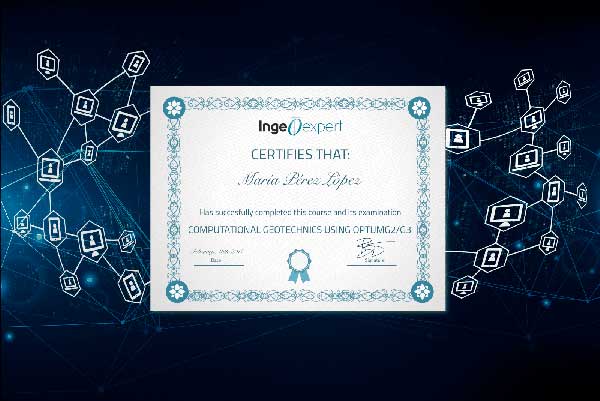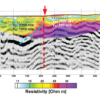Analysis and Design of Shallow Foundations
Online course |
|
50 hours / 6 weeks |
|
|
Dates: 14th of October to 25th of November |
| Standard | Unemployed Or Student |
| $292 | $216 |
Introduction
Most engineers with responsibility for design and construction of foundation and structure systems need a working understanding of basic concepts to gain confidence in dealing with a variety foundation and geotechnical related problems that they encounter on engineering projects. This course is designed so that participants can better understand foundation engineering and learn from experts in geotechnical engineering on how to design a safe and sustainable shallow foundation system in various site and loading conditions.
Objectives
This short course will focus on the analysis and design of shallow isolated, combined and mat foundation systems to resist vertical and horizontal loads coming from various superstructures including buildings, bridges, power plants, etc. All key concepts and guidelines will be explained and emphasis will be placed on the practical application of the information provided.
Week 1: Review of soil mechanics concepts needed for design of shallow foundations including basic soil mechanics concepts used in foundation design, shear strength, subsurface exploration, geotechnical drilling, sampling and field tests (SPT, CPT, VST, PMT).
Week 2: Shallow vs deep foundations, bearing capacity analysis, short vs long term capacity, limit state design.
Week 3: Bearing capacity in layered soils, applying factor of safety (LSD, LRFD), case study.
Week 4: Settlement analysis of shallow foundations; Stress increment from external loads, Immediate vs long-term settlement, methods to estimate immediate settlement, elastic modulus of soil.
Week 5: Long-term settlement in fine grained soils, estimating consolidation settlement, case study.
Week 6: Design considerations for shallow foundations, raft (mat) foundations.
Dr. M. T. Rayhani
Dr. M.T. Rayhani, P.Eng., is a Professor of Geotechnical Engineering and the director of Geo-engineering Research Group at Carleton University. He has over a decade of experience in research, teaching and engineering consulting, and has collaborated extensively with industry leaders worldwide. He has received research grants from the Natural Science and Engineering Research Council of Canada, Canada Foundation for Innovation, Transport Canada, and other funding agencies. Dr. Rayhani has presented short courses, seminars, and guest lectures on various topics related to frontier research in geotechnical and geoenvironmental engineering in Canada, the USA, France, Germany, Italy, India, Iran, and other countries. He holds a Ph.D. degree in Geotechnical Engineering from the University of Western Ontario and he is the author of over 50 publications in different areas of geo-engineering. Dr. Rayhani is a Registered Professional Engineer in the Province of Ontario.
The course is delivered online through our easy-to-use Virtual Campus platform. For this course, a variety of content is provided including:
– eLearning materials
– Videos
– Interactive multimedia content
– Live webinar classes
– Texts and technical articles
– Case studies
– Assignments and evaluation exercises
Students can download the materials and work through the course at their own pace.
We regularly update this course to ensure the latest news and state-of-the-art developments are covered, and your knowledge of the subject is current.
Live webinars form part of our course delivery. These allow students and tutors to go through the course materials, exchange ideas and knowledge, and solve problems together in a virtual classroom setting. Students can also make use of the platform’s forum, a meeting point to interact with tutors and other students.
The tutoring system is managed by email. Students can email the tutor with any questions about the course and the tutor will be happy to help.
This course would be beneficial to all civil engineering practitioners and especially to those involved in the design, approval and maintenance of foundation engineering projects and any other structural and construction systems, such as: civil, municipal, environmental and construction engineers, consulting engineers, plans review personnel in municipalities, public works professionals, plant engineers, who are involved with building and construction works, technicians and specialists, geologists and earth scientists, civil engineers who want to understand foundations or any other load carrying soil-structure systems. The course will be of value both for those who are new to foundation engineering as well as to those who have experience with foundations.
Once a student finishes the course and successfully completes the assignments and evaluation tests, they are sent an accreditation certificate. The certificate is issued by Ingeoexpert to verify that the student has passed the course. It is a digital certificate that is unique and tamper-proof – it is protected by Blockchain technology. This means it is possible for anyone to check that it is an authentic, original document.
This course will train practitioners that can work in any civil, transportation, housing and geotechnical related projects including the design and construction of houses, highways, railways, structures, bridges, municipalities, construction projects, and any consulting or construction companies involved with foundation engineering and design.
Introduction
Most engineers with responsibility for design and construction of foundation and structure systems need a working understanding of basic concepts to gain confidence in dealing with a variety foundation and geotechnical related problems that they encounter on engineering projects. This course is designed so that participants can better understand foundation engineering and learn from experts in geotechnical engineering on how to design a safe and sustainable shallow foundation system in various site and loading conditions.
Objectives
This short course will focus on the analysis and design of shallow isolated, combined and mat foundation systems to resist vertical and horizontal loads coming from various superstructures including buildings, bridges, power plants, etc. All key concepts and guidelines will be explained and emphasis will be placed on the practical application of the information provided.
Week 1: Review of soil mechanics concepts needed for design of shallow foundations including basic soil mechanics concepts used in foundation design, shear strength, subsurface exploration, geotechnical drilling, sampling and field tests (SPT, CPT, VST, PMT).
Week 2: Shallow vs deep foundations, bearing capacity analysis, short vs long term capacity, limit state design.
Week 3: Bearing capacity in layered soils, applying factor of safety (LSD, LRFD), case study.
Week 4: Settlement analysis of shallow foundations; Stress increment from external loads, Immediate vs long-term settlement, methods to estimate immediate settlement, elastic modulus of soil.
Week 5: Long-term settlement in fine grained soils, estimating consolidation settlement, case study.
Week 6: Design considerations for shallow foundations, raft (mat) foundations.
Dr. M. T. Rayhani
Dr. M.T. Rayhani, P.Eng., is a Professor of Geotechnical Engineering and the director of Geo-engineering Research Group at Carleton University. He has over a decade of experience in research, teaching and engineering consulting, and has collaborated extensively with industry leaders worldwide. He has received research grants from the Natural Science and Engineering Research Council of Canada, Canada Foundation for Innovation, Transport Canada, and other funding agencies. Dr. Rayhani has presented short courses, seminars, and guest lectures on various topics related to frontier research in geotechnical and geoenvironmental engineering in Canada, the USA, France, Germany, Italy, India, Iran, and other countries. He holds a Ph.D. degree in Geotechnical Engineering from the University of Western Ontario and he is the author of over 50 publications in different areas of geo-engineering. Dr. Rayhani is a Registered Professional Engineer in the Province of Ontario.
The course is delivered online through our easy-to-use Virtual Campus platform. For this course, a variety of content is provided including:
– eLearning materials
– Videos
– Interactive multimedia content
– Live webinar classes
– Texts and technical articles
– Case studies
– Assignments and evaluation exercises
Students can download the materials and work through the course at their own pace.
We regularly update this course to ensure the latest news and state-of-the-art developments are covered, and your knowledge of the subject is current.
Live webinars form part of our course delivery. These allow students and tutors to go through the course materials, exchange ideas and knowledge, and solve problems together in a virtual classroom setting. Students can also make use of the platform’s forum, a meeting point to interact with tutors and other students.
The tutoring system is managed by email. Students can email the tutor with any questions about the course and the tutor will be happy to help.
This course would be beneficial to all civil engineering practitioners and especially to those involved in the design, approval and maintenance of foundation engineering projects and any other structural and construction systems, such as: civil, municipal, environmental and construction engineers, consulting engineers, plans review personnel in municipalities, public works professionals, plant engineers, who are involved with building and construction works, technicians and specialists, geologists and earth scientists, civil engineers who want to understand foundations or any other load carrying soil-structure systems. The course will be of value both for those who are new to foundation engineering as well as to those who have experience with foundations.
Once a student finishes the course and successfully completes the assignments and evaluation tests, they are sent an accreditation certificate. The certificate is issued by Ingeoexpert to verify that the student has passed the course. It is a digital certificate that is unique and tamper-proof – it is protected by Blockchain technology. This means it is possible for anyone to check that it is an authentic, original document.
This course will train practitioners that can work in any civil, transportation, housing and geotechnical related projects including the design and construction of houses, highways, railways, structures, bridges, municipalities, construction projects, and any consulting or construction companies involved with foundation engineering and design.
1 review for Analysis and Design of Shallow Foundations
More info
Finish this course and get a certificate based on Blockchain
Analysis and Design of Shallow Foundations

Blockchain technology makes the certificate incorruptible, enabling companies to verifiy its autenticity.
Analysis and Design of Shallow Foundations
| $292 | $216 | |
| Get more information |





Soheil Mirzajanian Charandabi –
This course provides a comprehensive review of the fundamental principles of geotechnics, as well as the design basics of shallow foundations. It highlights the most critical factors that should not be overlooked during any construction project..